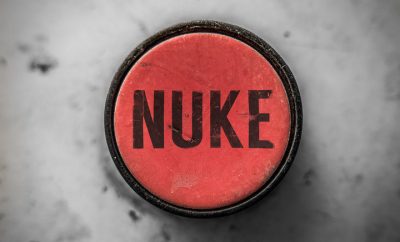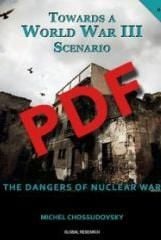Biden to Discuss Potential Use of Nuclear Weapons in Russian-Ukrainian Conflict

All Global Research articles can be read in 51 languages by activating the “Translate Website” drop down menu on the top banner of our home page (Desktop version).
To receive Global Research’s Daily Newsletter (selected articles), click here.
Visit and follow us on Instagram at @globalresearch_crg and Twitter at @crglobalization. Feel free to repost and share widely Global Research articles.
***
As the conflict continues to intensify in Ukraine, the West seems interested in driving a new wave of international nuclearization. Washington announced that it will be organizing a nuclear contingency plan in order to face an eventual escalation of the crisis between Ukraine and Russia. The American arguments to “justify” this type of measure are based on distortions of previous pronouncements made by Moscow’s officials, which reveals that NATO is ready to do anything to make the current situation a pretext for global re-nuclearization.
American President Joe Biden is about to start his tour across Europe to attend meetings at the European Council and NATO, where the main topic to be discussed will certainly be Ukraine. In a recent statement, White House spokespersons said that among the issues on the agenda for discussion will be the potential use of nuclear weapons in the conflict, which is being treated with increasing attention by the US government – supposedly in response to an alleged “Russian nuclear threat”.
National security adviser Jake Sullivan commented on the case, stating:
“President Putin in the early days of the conflict actually raised the spectre of the potential use of nuclear weapons. It is something that we do have to be concerned about. Based on our current analysis we have not changed our nuclear posture to date. But we are constantly monitoring for that potential contingency and of course we take it as seriously as one can possibly take it. We will be consulting with allies and partners on that potential contingency among a range of others and discussing what our potential responses are (…) [Joe Biden] will work with allies on longer-term adjustments to NATO force posture on the eastern flank. He will [also] announce joint action on enhancing European energy security and reducing Europe’s dependence on Russian gas at long last”.
When mentioning Putin, the American adviser refers to the episode in which the Russian president ordered the country’s nuclear forces to be placed on alert, in the last days of February. At the time, there was great tension and misinformation around the world, with pro-Western media outlets claiming that Putin was “threatening to use nuclear weapons”, which is absolutely false, considering that Putin’s order was just a punctual response to a previous controversial and bellicose speech by the British Foreign Secretary Liz Truss, in which the possibility of NATO involvement in the conflict was mentioned.
In addition, later Russian spokeswoman Maria Zakharova also had her words distorted by the Western media. Zakharova had commented during a press conference that a possible Third World War would be nuclear – leading Russia to avoid this scenario. At the time, Western agencies distorted the spokeswoman’s speech, also alleging some kind of threat (when, in practice, Zakharova has only said an obvious thing that everyone understands: that a new world war would be nuclear – which is precisely the reason why international society has been trying to avoid this situation since 1945).
On several occasions, Moscow officials have shown efforts to make even clearer the Russian position of trying to avoid, not provoke, the nuclear escalation of the conflict. For example, Kremlin spokesman Dmitry Peskov told CNN that his country would only use nuclear weapons if there was an existential threat to the existence of the Russian state:
“We have a concept of domestic security, it is public, you can read all the reasons for [Russia’s] nuclear arms to be used (…) If it is an existential threat for our country, then it can be used in accordance with our concept”.
It is no secret that Washington has been trying to re-nuclearize international relations in recent years. In 2020, the US government began to discuss the possibility of resuming nuclear tests, for example. This type of attitude emerges as an extreme and reactive measure in the face of the process of geopolitical decentralization. In other words, in the midst of the rise of the multipolar world, Washington’s last resort to protect its global dominance is to drive a new nuclear wave.
The main problem, however, is trying to justify the re-nuclearization plan with distortions of Russian pronouncements. At no time was there any Russian position in favor of the nuclearization of the conflict in Ukraine. On the contrary, Moscow has been clear in its stance: nuclear weapons are out of the question unless there is an existential threat to Russia. The reason nuclear forces are on the alert is simply because of the escalation promoted by NATO itself, with some Western political leaders considering greater involvement of the alliance in the conflict. Obviously, an eventual NATO action in Ukraine could be interpreted as an existential threat, as the bloc accumulates the largest nuclear arsenal in the world. So, for there to be no risk of escalation and for the Russian alert to nuclear forces to be revoked, the first step to be taken is for NATO to abdicate any involvement in the conflict that could constitute an existential threat.
A re-nuclearization of the world is unlikely to mean any kind of bellicose use of such weapons. Neither side wins in a conflict where two nuclear powers face each other and a war between Russia and NATO would certainly be the end of the world. So, obviously, the American attitude would not be to use nuclear weapons against enemies, but only to drive a new wave of nuclearization, returning to the tensions of the Cold War era. It is possible that nuclear tests will be resumed, for example, and that the production of new weapons will be boosted, creating a new nuclear race.
Unfortunately, while a nuclear conflict is virtually impossible, some degree of nuclearization seems an inevitable side effect of the current situation.
*
Note to readers: Please click the share buttons above or below. Follow us on Instagram, @globalresearch_crg and Twitter at @crglobalization. Feel free to repost and share widely Global Research articles.
Lucas Leiroz is a researcher in Social Sciences at the Rural Federal University of Rio de Janeiro; geopolitical consultant.
Featured image is from Huffington Post
 “Towards a World War III Scenario: The Dangers of Nuclear War”
“Towards a World War III Scenario: The Dangers of Nuclear War”
by Michel Chossudovsky
Available to order from Global Research!
ISBN Number: 978-0-9737147-5-3
Year: 2012
Pages: 102
PDF Edition: $6.50 (sent directly to your email account!)
Michel Chossudovsky is Professor of Economics at the University of Ottawa and Director of the Centre for Research on Globalization (CRG), which hosts the critically acclaimed website www.globalresearch.ca . He is a contributor to the Encyclopedia Britannica. His writings have been translated into more than 20 languages.
Reviews
“This book is a ‘must’ resource – a richly documented and systematic diagnosis of the supremely pathological geo-strategic planning of US wars since ‘9-11’ against non-nuclear countries to seize their oil fields and resources under cover of ‘freedom and democracy’.”
–John McMurtry, Professor of Philosophy, Guelph University
“In a world where engineered, pre-emptive, or more fashionably “humanitarian” wars of aggression have become the norm, this challenging book may be our final wake-up call.”
-Denis Halliday, Former Assistant Secretary General of the United Nations
Michel Chossudovsky exposes the insanity of our privatized war machine. Iran is being targeted with nuclear weapons as part of a war agenda built on distortions and lies for the purpose of private profit. The real aims are oil, financial hegemony and global control. The price could be nuclear holocaust. When weapons become the hottest export of the world’s only superpower, and diplomats work as salesmen for the defense industry, the whole world is recklessly endangered. If we must have a military, it belongs entirely in the public sector. No one should profit from mass death and destruction.
–Ellen Brown, author of ‘Web of Debt’ and president of the Public Banking Institute

